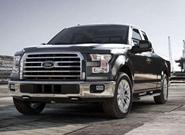Analysis

September 22, 2015
SMDI President Predicts “Steel Will Win Out” Over Aluminum
Written by Sandy Williams
“Steel will win out,” said Larry Kavanagh, president of the Steel Market Development Institute (SMDI) when asked about the use of aluminum in the automotive industry. SMU talked with Kavanagh about Ford’s announcement that it will increase the use of aluminum in the F-150, and potentially other vehicles, using Alcoa’s Micromill technology.
The new Micromill aluminum is thinner with increased formability and can be cast and rolled in 20 minutes instead of 20 days in a traditional rolling mill.
“The first use of high-strength Micromill aluminum alloy will be direct replacements of conventional aluminum parts located in the 2016 F-150’s wheelhouse, front floor and tailgate. Over time, we will transition other parts to Micromill metal,” said Mike Levine, Ford Truck Communications Manager.
Kavanagh said he is not surprised by the move. The aluminum industry is working to develop new materials and it is not surprising that Ford would want to experiment with them, he said. The steel industry is developing new steels all the time and both industries are driven by the need for auto manufacturers to reduce weight in their vehicles to increase fuel efficiency.
“What did surprise me, said Kavanagh, “was the low strength of the Alcoa aluminum at 280 Mpa. That is at the very low end of strength, he said, with advanced high strength steels at 980, 1180, and 1500 Mpa for bumper applications.
Kavanagh said “it gives me confidence that AHSS will still be the strongest value material for taking weight out.”
One thing the public doesn’t understand about light-weighting vehicles is that it is not “can you get the most weight out, it’s can you get enough.” The body parts and structure are only part of the equation in achieving fuel economy; it is also about engine and transmission efficiencies.
Advanced high strength steels can provide much higher value than aluminum for reducing weight in vehicles, without the expense of having to retool factories said Kavanagh.
General Motors has shown its support of steel with the release of commercials that test consumer confidence in the strength of steel over aluminum. Consumers are asked to choose the safety of a cage made of steel or aluminum when threatened by a grizzly bear; steel was the material of choice.
Among the steel intensive vehicles are the Chevrolet Colorado and GMC Canyon which use 70 percent AHSS. The all steel Chevrolet Colorado won the Motor Trend 2015 Truck of the Year and was nominated for North American Truck of the Year.
Kavanagh declined to give any predictions on the growth of aluminum versus steel, noting there will be ups and downs as manufacturers try out new materials including aluminum and composites. Each vehicle and manufacturer is a different business case, he said. Advanced high strength steels have the advantage of being light, strong, and affordable and costing the consumer less for repairs.
“We obviously have a plan,” said Kavanagh. “Steel will win out as more auto manufacturers get the full potential out of steel,” he added.
The focus for SMDI is not on what the other team is doing but what the steel industry can do. And, Kavanagh says, that is to continue to develop new grades of steels and get them as quickly as possible into the market.






